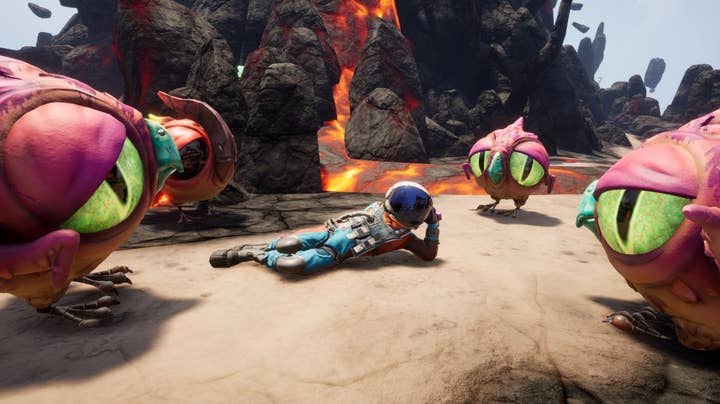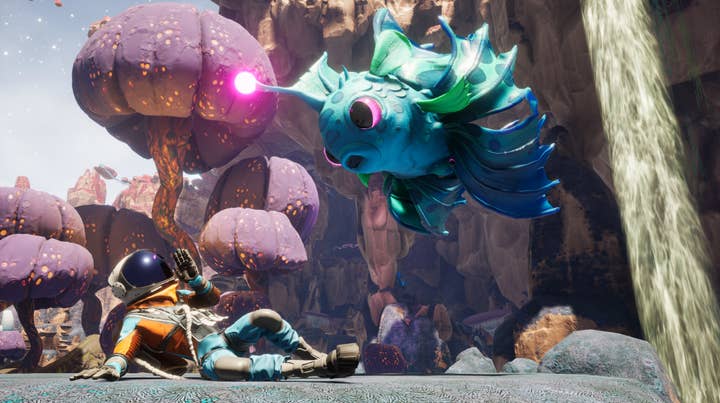Return to the Savage Planet: Raccoon Logic on sequels, big companies and economic turmoil
“I couldn't imagine going back to a big company," says Alex Hutchinson
Raccoon Logic is making a new game in its Savage Planet universe.
It's not exactly a surprise considering the lengths the studio went through to get the IP back. The first game was created by the same team (then Typhoon Studios) but within the Google Stadia division before it closed. And although Google were amenable to returning the game to its creators, it was quite the process.
"It was countless accountants, lawyers… lots of discussions," says executive producer and Racoon Studios co-founder Reid Schneider. "Because we had been employees of Google, there were discussions around how a transaction would be structured so they would be no liability."
Creative director Alex Hutchinson adds: "Google is extremely fearful of litigation because they're sued every day by everybody. They wanted to make sure it was transparent and clear, which made it incredible complicated. We now have tax obligations that will haunt us to the grave. We get audited by multiple companies, it is horrible.
"It was one of the things that were incredibly complex, and incredibly dull."
.jpg?width=720&quality=70&format=jpg&auto=webp)
In fact, the deal took so long that the IP hadn't even been acquired by the time the studio had started.
"We had people starting asking what they should do, and we were like: we're going to need a couple more weeks," Schneider laughs.
Raccoon Logic didn't need the Savage Planet IP to exist. The developer was backed by Tencent even before it acquired the rights. So why was it so important to put themselves through such a process?
"When you work for bigger studios, the technology base you have and the tool base you have is such a leg-up on the more boring parts of game development," Hutchinson explains. "I personally don't need to redesign another input method for a joypad. It's not interesting, you're not going to innovate on it, nobody cares about it from the player-facing standpoint. There's big percentage of development, if you start from scratch, spent on just meat and potatoes of development, before you get to the interesting things that players care about. Getting the code-base basically gave us back 18 months of boring work."
Schneider continues: "Also, the first game… we had some moderate success. And building a new IP is really tough. People enjoyed the game. So to start from scratch… there's no guarantee we will be able to catch lightning in the bottle twice."
Hutchinson again: "I always love the first sequel, too. Because you leave a lot on the table when doing the first one. And you've got through all the arguments with the team on what could work and what should work. So everyone believes a bit more going into the second one, and they're not bored of it yet. We are in that sweet spot."
Schneider and Hutchinson say that the team is 100% focused on the next Savage Planet game. There's no side projects or new business opportunities being developed.
"We want to try and just do one thing and do it better than everyone else," Schneider explains. "Rather than trying to do 12 things that might not end up fully cooked. When I was at Warner, we tried to do too many things. A lot of these companies who [recently got] financed, they end up starting all these crazy initiatives. We came from a place of 'let's just make a great game'.
"When you look at the climate right now, what you're seeing is this [investor] pull back… all these random initiatives that companies started, where so much of it is half-cooked or not fully thought through… that is where you start to see a massive correction. Because all of these companies tried to do too much, and got side-tracked from their core business."
"There are no weird side-projects here. There's no blockchain, or VR, or Web3"
Reid Schneider, Raccoon Logic
Hutchinson adds: "If they had a core business. Because you'll see a lot of companies who haven't even made a game."
Back to Schneider: "There are no weird side-projects here, like this guy is making the iOS app, and this person is doing the VR thing. There's no blockchain, or VR, or Web3."
Hutchinson quips: "I didn't even know I was on Web2."
So we know what the next Savage Planet game won't be, but what will it introduce? Hutchinson says the team is excited by Unreal Engine 5, while Schneider is intrigued by the promise of user-generated content. But these are all just tools in trying to build a genuinely funny game.
"There's a big market segment in movies and books and TV [for comedy], and it's finding one in games, and finding what we're not doing to make uniquely funny games," Hutchinson explains. "For me, funny games have historically been in the dialogue, not in the actions. And there is a playable slapstick that we touched on that we are really trying to dive into. Telling a joke is funny once, slapping Reid off a cliff is funny forever… so how we find more opportunities for the players to tell themselves jokes."

Raccoon Logic is 30 employees, with no plans to expand further (the company says it will work with more outsource partners). When the studio launched, there was criticism on the its very male and very white staff make-up. Hutchinson and Schneider reveal that since then, over 45% of its new hires have been from diverse groups.
Outside of the team itself, Hutchinson and Schneider are keen to highlight its cultural diversity, specifically its work with local French Canadian actors.
"One thing we realised with the first game, whenever we localised into French, we always localised into Parisian French," says Hutchinson. "But we have better access. So we decided to lean into the local industry, there are lot of great actors down here, and do the game in Quebecois… we had one French guy who was worried people in France wouldn't understand, which was a bit like saying we don't understand the Scottish accent [laughs]. We have the first two and only two French Canadians nominated for voice acting in the Canadian video game awards, which was really cool. We hope to tell some appalling jokes in Quebecois."
.jpg?width=720&quality=70&format=jpg&auto=webp)
The original Journey to The Savage Planet tried a bit of everything. It was on Stadia, there was an Epic Store deal, Game Pass, PlayStation… so we had to ask Hutchinson and Schneider how they found working across these different platforms.
"When I was growing up watching movies and saw there were 14 production houses involved in a film, I always wondered how that happened… and now we know," laughs Hutchinson. "To get something up and running, you end up cutting deals with everybody. You are always managing the buffet of deals, to get as many opportunities to find an audience as possible."
He continues: "Overall it worked because we had a balance of things. I'm a little scared of the future where we could only be on a subscription platform. because I think it would push games towards certain models and away from others. I think if we got paid in terms of 'time played' then story-based games are a terrible decision. You will need to do more multiplayer and more service-based games with a long playtime. I think subscriptions suit some games more than others."
If Hutchinson is anxious about the future of business models, he seemed relaxed about the state of the business right now. There are signs in the data that consumers are being more selective in what they're buying, and they seem to be drifting towards the bigger brands. But Hutchinson has no desire to return to his former life as a big AAA game maker.
"Whenever I think about whether I'd ever go back to a big company… I am reminded that they chase the craziest things. The obsession right now with live ops and service games… Sony has started ten of them, but the market can only support two. So are they actually saying that eight of you are going to die?
"Sony has started ten live-service games, but the market can only support two. So are they saying that eight are going to die?"
Alex Hutchinson, Raccoon Logic
"Whereas the smaller games, those ten to 12 hour experience, these games you can play a lot. I can chew through one a week. I think there is more opportunity there. It lets you pick stronger flavours, it's less expensive to make, so you can take crazier risks which helps you stand out. I couldn't imagine going back. The fact that the AAA studios are abandoning [these games]… it's fantastic. Make more of those live service games, I love it. Do more Gotham Knights and Suicide Squads and whatever Sony is making, I love it. See you in eight years. I will have made three games."
However, Schneider says that doesn't mean the company is against supporting its titles long-term.
"If you look at something like Vampire Survivors. That team, now that they have a player base, they can support it for the next few years. And the team size is probably around the size of what we have. If we can get to a place where we can continue to provide content and have a player base… but it's not like you need ten million players from day one or it's an epic fail… if we can grow something special over time, and people respond to it… that's a really interesting model."
Ultimately, Raccoon Logic is confident in this middle market for game development. At least, when it comes to those teams who are making things.
"The market is tightening, but I don't mind that," Hutchinson says. "When it gets tighter, you're competing with the survivors and the people who can make actual games. It gets rid of some of the noise and churn in the market of people who weren't actually creating content. It makes everyone focused, it tightens your attention, it tightens your audience's attention. It's not always a bad thing when the belts tighten a bit."
"I don't want Bitcoin bros debating games"
Alex Hutchinson
Schneider adds: "It really focuses on the people who is excited about the craft of making games, rather than those who are in it for the monetary opportunity. It becomes about making something exciting that goes on a screen, rather than some new-fangled technology that makes money, but it might not feel so good."
Hutchinson again: "If you look at some of the announcements some of these companies are making, they talk about everything but a game. They either talk about the tech or social issues or it's just a white paper… and we're like 'but what is the game?' We're seeing a lot of those companies struggle, and that doesn't bother me at all. I don't want Bitcoin bros debating games.
"We're focused on making a game in the Savage Planet universe. And pushing harder about what we feel worked about that first one: humour, player choice and making a funny exploration game."
Schneider concludes: "We hope people like it and still find us funny."
Hutchinson quips: "Otherwise we'll be with those Bitcoin bros."

